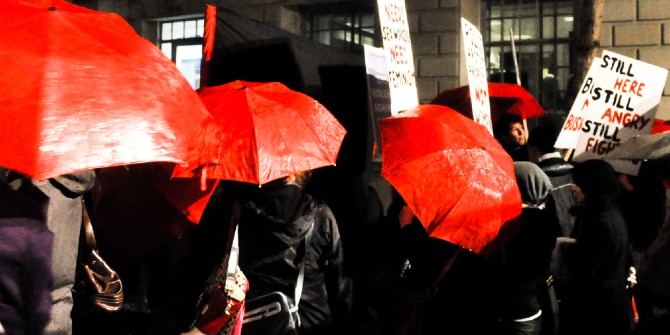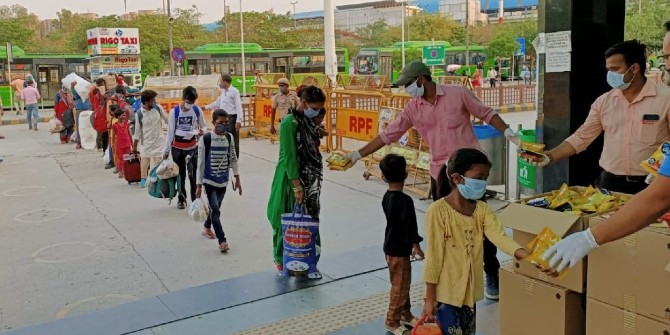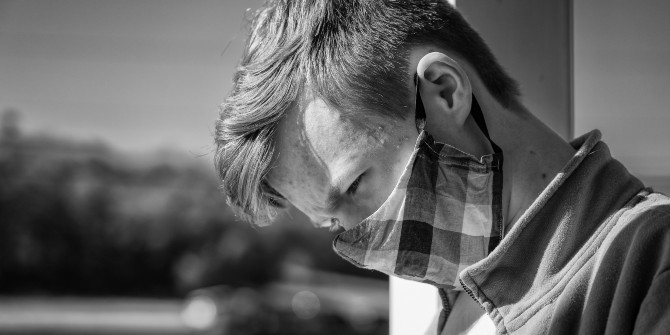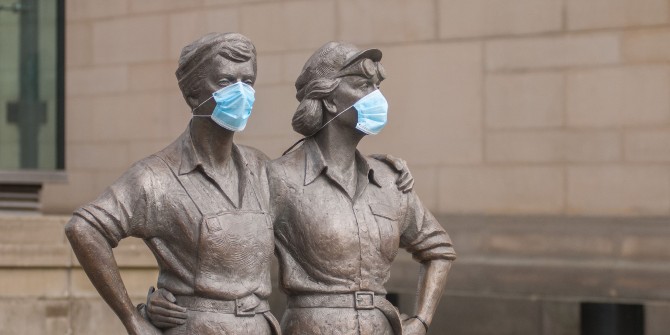Sex workers, like the majority of society, have suffered from the effects of austerity – and COVID-19 has left them even more exposed. Natasha Mulvihill (University of Bristol) argues that legal and welfare reform are needed to enable choice and reduce harm.
In 2019, I co-authored a Home Office-commissioned report with colleagues at the University of Bristol on the nature and prevalence of prostitution and sex work in England and Wales. As part of that research, we heard from over 500 individuals involved in selling sex, and followed up with more than 40 within that group to learn more about their experiences. Since the COVID-19 pandemic and lockdown, I have been thinking about our participants in that research and how they are managing.

The challenges facing those who sell sex both in the UK and around the world during the pandemic have been articulated in academic journals, by organisations working with and representing sex workers (including NUM, ECP, Changing Lives, Beyond the Streets, SWARM and One25) and on news and social media. Of course, many of those selling sex are unaffiliated to any group or support organisation: they work alone in privacy or remain outside the public and media gaze, through choice or otherwise.
There is stark commonality, but also diversity across the sex industry. Most are working in-person, providing sexual services, including full sex either at home, outdoors or in another venue such as a brothel, parlour or hotel; others are working through phonelines or online, webcamming or making clips to order, for example. Given the lockdown, there has been some movement to online, but many will have continued to work in-person. Most sellers are women, including trans women. There are also a significant number of male sex workers, as well as those who identify with other genders or none.
Some are successful entrepreneurs, running their own websites, operating from dedicated premises, registered as self-employed and paying tax. A proportion of these may therefore have met the criteria to apply for the UK Self-Employment Income Support Scheme set up in response to the lockdown. However, the Home Office research suggested that the majority of those selling sex are either doing so temporarily, intermittently or long term to make ends meet, including as a supplement to other paid work. Many are caring (often solo) for others, including children, partners or parents; some are managing long-term physical illness or mental health issues; many are migrants, some with insecure status; some are students; some involved are victims of partner abuse, or are misusing drugs or alcohol. Some may register their earnings formally; most will not. I would term this majority as ‘sex workers’ or ‘individuals engaged in survival sex’ (see Mulvihill, 2019), and it these groups that are the focus of this commentary. There are also a significant number of mainly women and girls who are coerced into, and abused by others through, ‘prostitution’ – which, while recognising the overlap and movement between categories, I would rather term ‘sexual exploitation’.
The COVID-19 crisis has brought into sharp focus two issues for those engaged in sex work and survival sex in the UK: the inadequacy of the legal environment, and the inadequacy of the welfare safety net and public provision.
In England and Wales, it is legal to sell and to buy sex. However, myriad activities around the sale of sex are illegal, such as pimping, kerb-crawling, soliciting on the street or working with one or more other people from a premises, as this constitutes a ‘brothel’. These laws have been layered piecemeal over decades and are unevenly enforced, more so given tightening police resources. They are ostensibly aimed at preventing exploitation, but stem as much from a concern to keep such activity out of public view.
Whether you understand selling sex as a job like any other or as an outcome of patriarchy and other inequalities – or both – most can agree that sex workers should not be criminalised. Governments should seek to allow sellers to work together in a small-scale and self-managed way. Such brothels already exist up and down the country, but sex workers risk inconsistent policing, depending on where they are located. The illegal status of brothels places barriers to reporting violence or other crimes against sellers. Those selling sex on the street should not be criminalised. Equally, the concerns of communities in relation to both indoor and outdoor sex work need to be recognised and negotiated. Rather than seeking to manage outdoor sellers, far more resource should be invested in tackling the drivers for street sex, which are well documented (see for example, Matthews et al., 2014; Sanders, 2007).
The legal status of sex workers links to the second issue of access to welfare and collective provision. The UK, like other liberalising economies, has seen a steady erosion of the welfare safety net. The threshold for eligibility is ever higher and the benefit received ever lower. State dependence is stigmatised and personal responsibility prized (though inheritances and other financial support from one’s family are encouraged). Sex workers, like the majority of society, are vulnerable. Not vulnerable in the sense of helpless or lacking resourcefulness, ability or graft, but rather vulnerable through exposure to changing individual circumstances and unforgiving welfare and legal contexts. Many of us can face this sudden exposure when we find ourselves caring for others, made unemployed, discriminated against, migrate or become ill. Surveys in the US and UK suggest that at least a third of millennials, for example, have no savings put by; and another third would only have three months pay if their income stopped. So a safety net, whether that is short or longer term, is crucial both to uphold human dignity but also to avoid the future multiplier costs to the state of economic and social exclusion.
Yet austerity and the difficulties in accessing Universal Credit have pushed many into exchanging sex for money. How ironic that now the COVID-19 crisis is affecting mainstream workers, the government has adopted a ‘pay now, verify later’ approach to Universal Credit – and that borrowing, minimised for a decade in favour of austerity, has reached unprecedented levels in order to stave off a depression. Had we prioritised spending after the 2008 financial crisis to invest in a fairer safety net and more robust public provision, we might have been better equipped to meet the challenge of the pandemic.
Around the world, those who sell sex (including those who add significantly to national income through the tourism and leisure industries) have found that they either have no access to government income support (France, Thailand, Japan or Kenya) or minimal access (Brazil or Mexico). In New Zealand, by contrast, where sex work is decriminalised, applying for help has been more straightforward.
The pandemic has temporarily allowed us to see alternatives to the current order. It is possible to hold quite divergent views on prostitution and sex work, yet at the same time agree that punitive criminal justice or welfare measures appear only to harm those who sell sex – indeed, harm all those exposed by social inequity or a change in circumstances. By lifting those selling sex out of social, economic and legal grey zones and giving them the resources to stand in equality with others, they can determine their own futures.
This post represents the views of the author and not those of the COVID-19 blog, nor LSE.






How ironical today’s aggregate demand , wherein the earning capability of women in society is so less than her objectified sexuality .. example of the Aussie Car racer an example!
Is this the price of an hedonistic society?
Hi! nice piece from you. the world must stop all these patriarchal ideology of blaming the very victim. women should be allowed to decided what they do with their bodies….indeed casual observation has shown an adverse economic effects of Covid-19 on women sex workers..am working on a studies on that currently in Nigeria.
Sex workers who are homeless, use drugs, or are migrants with insecure legal or residency status face greater challenges in accessing health services or financial relief, which increases their vulnerability to poor health outcomes and longer-term negative economic impacts. I’ve seen Prostitutes like this I think should not be forgotten in these time of Covid
Hi
I have not found much research into the health risk COVID-19 poses to sex workers.
There seems to be considerable evidence the continued exposure, such as with Taxi drivers or security guards puts them at a much higher risk of dying due to regular exposure.
I imagine this risk must be even higher for sex workers?
I imagine many sex workers also have less access to healthcare due to their vulnerable situation socially and economically.